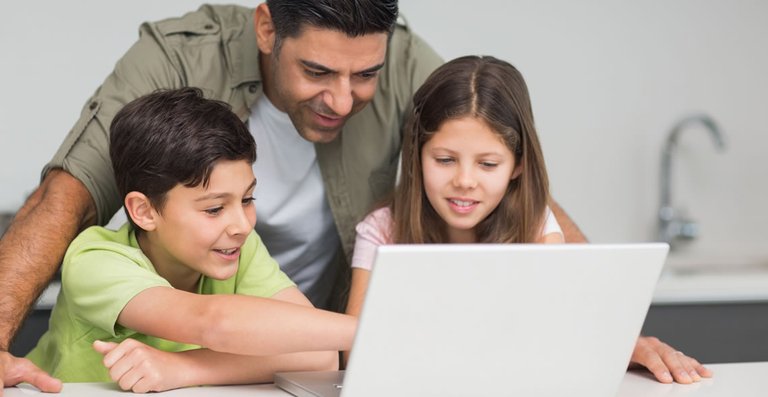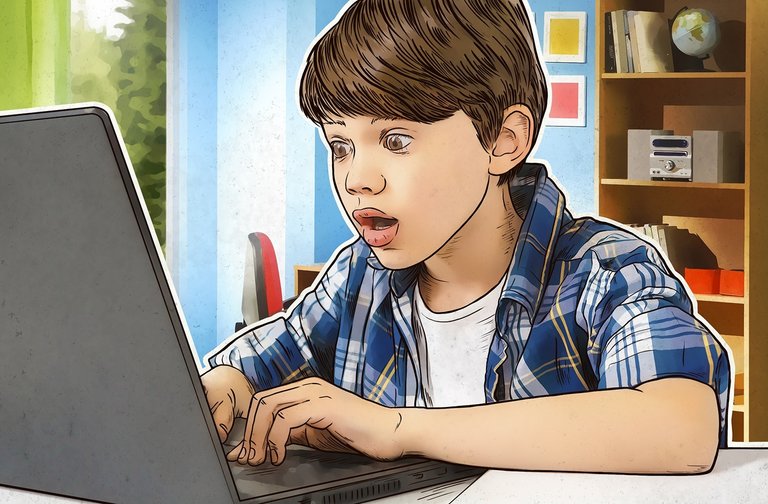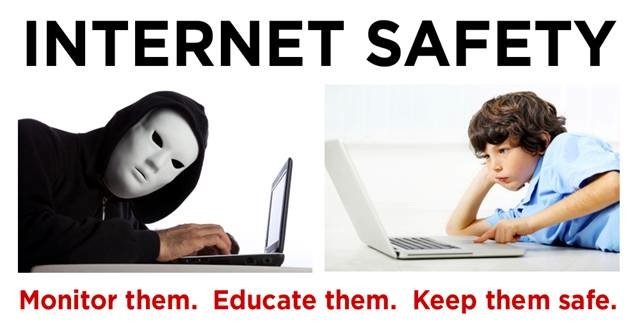Internet is now part of our lifestyle and it is wrong not to accept that we are many ways dependent on it, be it any part of our life, from buying, learning, communication to entertainment. Since there are side effects of the internet technology, we need to educate our children accordingly.

Source
1. Teach Internet Security
The child should get acquainted with the rules of behavior on the Internet as soon as he learns to open the browser. Tell him what online can rob, hurt and scare, as well as harm your smartphone or computer. However, with simple rules, this can be avoided. Here are the main ones:
You can’t buy anything, including inside apps.
You can not download music, games, applications, books and other content from unverified sites.
You cannot chat with strangers in instant messaging programs and on social networks. Even with children: a boy or girl can easily turn out to be a grown man.
You can’t disclose personal information: home address and phone number, income level of parents, number of school in which you study.
You can not upload too frank pictures and indicate the geolocation if the photo was taken in an apartment or in a school yard.
Learning games will help you become familiar with the rules of online behavior. So, “I-risks” is devoted to safe behavior on the Internet, “Cool games” - to the rules of communication with cyberbullers. Both games are designed for teenagers from 12 years old, and younger children can play them with the participation of parents or teachers.
The longer parents will be able to help their child in a friendly way to master the Internet space, including starting pages on social networks, posting photos, updating antiviruses and playing games, the better.

Source
2. Encourage stories of dubious information
According to Secure Internet of the future The regional public center for information technology, one in five children 12-13 years old does not turn to anyone for help in case of cyberbullying. And only 17% tell their parents about it.
In order for the child to talk about friends, offenders, offers to go somewhere, indecent photos or pictures sent by outsiders, parents need to establish friendly contact with him. The child will be happy to share any information only on condition that they will not criticize him.
Children hide information from their parents, because they believe that they will not have to wait for anything from parents except hysterics, Internet bans and scandals. Only calm, friendly communication will protect the child from real misfortune in time.
Tell your child that if a problem occurs on the Internet, he can call the Children of Russia Online service at 8 800 25-000-15. Operators provide psychological and informational support on weekdays from 9.00 to 18.00 Moscow time.

Source
3. Allow gadgets to be used only in the common room.
Standing over the soul is not necessary. Put the child where you can see the screen of the gadget from which he is viewing information. If he protests, explain that this is necessary for his own safety.
4. Set control on available devices
According to Children's Internet Usage Study Of the US Cybersecurity and Education Center, 62% of children 9-15 years of age go to adult sites after they find them in a search, 21% watch videos intended for adults , 31% lie to sites about their age and 20% intentionally search information for adults.
You will not be able to reach all the gadgets with which the child will go online. However, it is in your power to secure those that are at home. For this:
Install antivirus .
Install the parental control program.
Enable secure browser searches.
Install browsers for children. For example, " Gogul".
Allow to use only sites for children. For example, sites with the domain ". Children ".
Install apps adapted for children. For example, YouTube.
Protecting your child from adult information is almost impossible. Children bypass parental restrictions and restrictions, skillfully deceiving adults. They all watch YouTube during school breaks and already in the third or fourth grade they know about pornography and drugs.
5. Make friends on social networks
Social networks will help to quickly learn about the interests and experiences of the child and to maintain communication with him. Add it to your friends, share links, like. But in no case do not criticize the pages of friends or his own, do not overwhelm with comments. After all, if the child becomes uncomfortable, he will start a second account, which you will not know about.
It is important to be friends with the child, including online, to be aware of everything that he learns. Watch his favorite bloggers on YouTube together and, more importantly, know with whom he is friends and communicates.

Source
6. Do not meddle in demand
An innocent desire to read a child’s correspondence violates their right to privacy and secrets. Show respect and hold back. If you can’t cope with the desire to control everything , consult a psychotherapist. Indeed, to know what is happening in the life of a child, you need to build a trusting relationship with him.
You can not get into the correspondence of a child without his permission. This can greatly reduce the children's credit of trust in parents. The consequences of this can be even more devastating than what parents learned from the correspondence.
And if you still could not restrain yourself and spied, then do not pay attention to profanity and rudeness. The only important thing here is the danger: discussion of fights, drug offerings, invitations from adult strangers, intimate photos. And if you found any of this in correspondence, then gather your will in a fist, apologize for breaking the borders and explain to the child what is threatening him. Moreover, it is very important to maintain an atmosphere of goodwill, no matter how difficult it is.
Hi, your articles are interesting. I am adding you to my funbase. :) Also I promote this article to C2 curation community.
Have nice day.
Thanks @petrvl
This post was shared in the Curation Collective Discord community for curators, and upvoted and resteemed by the @c-squared community account after manual review.
@c-squared runs a community witness. Please consider using one of your witness votes on us here